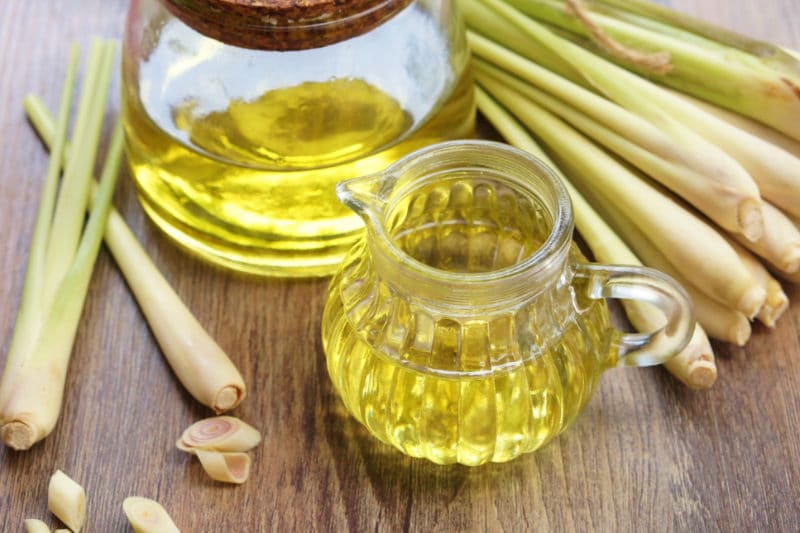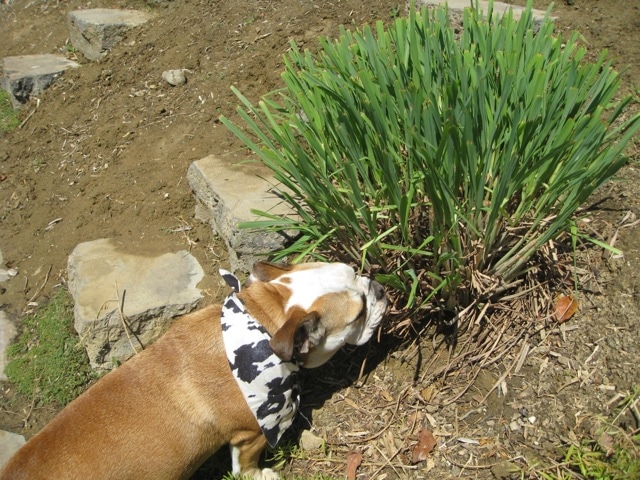Over the past few years, essential oils have become increasingly popular for helping people with everything from skin conditions, sleep, headaches, to sore throats.
More recently, many dog parents realized that the healing power of essential oils could be extended to their fur babies as well.
However, not all essential oils are safe dogs.
So, which essential oil is safe for your pup?
Well, there are a couple of oils that are safe for canines but in this post, we will focus only on one: lemongrass oil.
Is it safe for your pup? Let’s find out but before then…
What is Lemongrass?

Lemongrass (Cymbopogon) is one of the over 50 species of grasses in the Poaceae family.
It is native to tropical regions of Asia, South Asia, Africa, Australia, and Oceania.
Of its many varieties, the Cymbopogon citratus and Cymbopogon flexuosus are the most popular.
The former is primarily used for culinary purposes while the latter is widely used to produce essential oils and perfumes.
The plant has stalks that are usually fibrous and smell like lemons.
In India, Thailand, and China, the herb has been used as a flavoring agent in desserts, beverages, and a wide range of other culinary preparation due to its ability to boost digestion, blood circulation, and immunity, relieve menstrual cycle irregularities and treat infections.
In Sri Lanka and East India, the herb was used to make curries, soups, and “fever tea”, a local drink for treating fever and a wide range of ailments like diarrhea, stomach aches, menstruation, and skin conditions.
In Cuba and the Caribbean, the herb continues to be used to aid digestion and lower blood pressure.
Like other essential oils, lemongrass oil is produced through steam distillation of fresh or partly dried leaves of the lemongrass herb.
The oil excludes fresh, sweet, and light scent with a hint of lemon and often ranges in color from yellow to amber.
For more information about the distillation process, check out this video:
Is Lemongrass Safe For Dogs?
Generally, it is safe to grow lemongrass in gardens or backyards where dogs have access.
This implies that lemongrass is not extremely toxic like foxglove, dogbane, monkshood, yarrow, iris, Hosta, Lenten rose, and other plants that are considered to be poisonous to dogs.
And given that dogs are not herbivores, there are fewer chances that they will eat much of any herb.
That being said, dogs’ digestive systems are not designed to process plant matter (they are primarily carnivores).
So, consuming considerably large quantities of lemongrass can cause perilous intestinal blockages.
Symptoms of intestinal blockage in dogs usually occur within 24 hours after consuming something indigestible and could include: vomiting, abdominal pain, fever, distended stomach, inability to eliminate, straining on deification, loss of appetite, and shock.
If you suspect that your dog has eaten large amounts of lemongrass, monitor him closely for the above symptoms, and if he starts showing some, head to the vet.
Is Lemongrass Oil Safe For Dogs?

Before we delve deeper, you should understand that lemongrass and lemon oil are different oils. The only thing they share is the lemony scent.
Lemon oil is often cold-pressed from lemon peels while lemongrass oil is steam-distilled from Cymbopogon flexuosus grass as shown in the above video.
Since they are derived from different plants, they also have different chemical structures.
Additionally, lemon oil is phototoxic, which implies that you should avoid exposing your skin to the sun within 12 hours of using it.
On the other hand, lemongrass oil is non-photo toxic but may have skin sensitization risks.
Let’s now focus on lemongrass oil versus the safety of your dog. Is this essential oil safe for dogs?
The short answer is: NO. Lemongrass oil is not safe for dogs because it contains higher amounts of cyanogenic glycosides and essential oils.
Let’s dig deeper:
Cyanogenic glycosides
Cyanogenic glycosides are natural toxins that plants produce as a defense mechanism against herbivores and pathogens that damage plant tissues.
Exposure to cyanogenic glycosides may lead to acute intoxication in dogs.
Essentially, as your dog consumes the oil, the cyanogenic glycosides are hydrolyzed into cyanide, which causes intoxication.
In particular, cyanide interacts with iron in cytochrome oxidase, blocking terminal electron transfer and cellular respiration.
As a result, the dog’s hemoglobin ceases to release oxygen. This interferes with oxygen delivery to the tissues and the dog becomes severely hypoxic.
Convulsions and even death may result due to cerebral hypoxia.
Pro Tip: Lemongrass is not the only plant that accumulates Cyanogenic glycosides.
Others include Elderberry, legumes like vetch and clover, pome fruits (like pears and apples), and pitted fruits (like almonds, cherries, and peaches).
Risk of Essential oils
Chemicals in essential oils (such as functionalized derivatives of alcohols, esters, ketones, and phenols, etc) can readily get absorbed into a dog’s system—whether received orally or via the skin—and metabolized by the liver.
Consequently, essential oils can be detrimental to the health of puppies, senior dogs, and those with liver diseases.
If you suspect that your dog has licked off substantial amounts of essential oils, monitor him for essential oil poisoning symptoms (see below) and if he starts showing any kind of negative reaction, take him to the vet.
Common symptoms of essential oil poisoning include drooling, redness of lips and gums, low body temperatures, panting, coughing, wobbliness, lethargy, tremors, panting, difficulty in breathing, watery eyes, and liver failure.
Lemongrass oil also has high citral content, which may potentially burn your dog’s skin.
So, avoid using the essential oil on your dog’s skin without the supervision of a vet.
Lemongrass oil could also lead to lowered blood glucose levels.
So, allowing your dog to consume lemongrass oil could have negative health effects on him if he is diabetic or on diabetes or hypertension drugs.
Are Products That Use Lemongrass Oil Safe For Your Dog?

Due to its citrus-like scent, lemongrass oil is used in a wide range of dog shampoos, sprays, and perfumes.
It is also used in flea collars and sprays due to its flea and tick repellant nature.
Citronella is also derived from Cymbopogon nardus and can be used in mosquito, flea and tick repellent products for dogs.
Now that you know the potential risks of lemongrass oil in dogs, are the above products really safe for your dog?
Well, the quick answer is: Yes, most of these products are manufactured with the safety of your dog in mind.
Manufacturers of these products also include directions on how to safely use these products on your dog.
For instance, some manufacturers suggest that you dilute essential oils in Coconut, Jojoba and Olive, and other carrier oils before applying them topically on your dog’s skin.
If you can follow these directions carefully or use the right dosage that’s recommended by the manufacturer, these products remain safe for your canine friend.
Most importantly, if you have any questions concerning the oil or how to use it effectively, you can always consult the product manufacturer or your vet.
Parting Thoughts
Hopefully, now you understand where lemongrass oil stands as far as the safety of your dog is concerned.
While there are many flea and tick repellant products out there with lemongrass oil as the main ingredient, always keep in mind that “green” doesn’t necessarily mean “safe”.
You should also remember that the dose often makes the poison and no two dogs react the same way to any substance.
If you want to use lemongrass oil on your dog, there’s a way you can do it safely: consult your veterinarian.
Your vet will let you know whether it is safe, what to expect, and what you can dilute it with to make it safer for your dog as well as the right dosage depending on your dog’s breed and age.
Related Post:
Is Diffusing Peppermint Oil Safe for Dogs?
Is Thieves Oil Safe for Dogs?
Is Jasmine Essential Oil Safe for Dogs?
12 Essential Oils for Dog Gum Disease
What Essential Oils are Toxic to Dogs?
As an Amazon Associate, we may receive a small commission from qualifying purchases but at no extra cost to you. Learn more. Amazon and the Amazon logo are trademarks of Amazon.com, Inc, or its affiliates.

